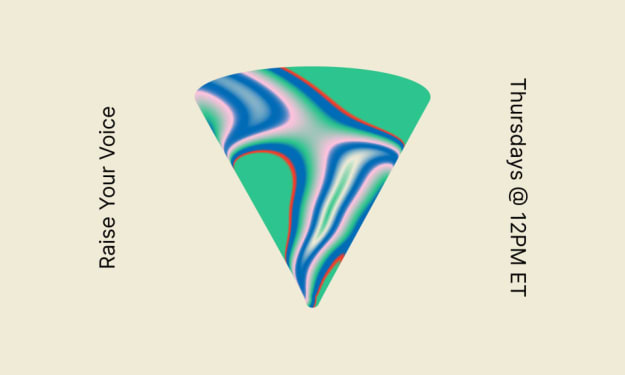Why Do Writers Love Pain?
How to get FEWER rejections and MORE publication credits

Look at the stats. Writers keep signing up for the hurt by sending their words out into the cold, hard world and inevitably getting oodles of rejections. But there are a couple key steps to avoid the common mistakes that will get your story, essay, poem, novel, etc. thrown into the (electronic) trash heap.
Absolutely Ignore... the Absolutes
First, make sure you know good writing advice from bad.
If you’ve been online for longer than ONE second, you’ll see that lots of the writing advice given out by "experts" on most platforms is… well, it’s crap, to be honest. And it often follows along the lines of:
—“ALWAYS do this.”—
—“NEVER do that.”—
My advice is: always avoid people telling you to always do something. (See what I did there?)
Avoid the absolutes when someone gives you advice because writing, like life, is subjective. There is no “one size fits all” strategy, no matter who tells you there is. And what works for one writer to "Earn a Thousand Dollars in a Week!!!" (or other attention-grabbing and completely impossible-to-recreate clickbait promise) might only work for them and not for you.

Don’t Reinvent the Wheel
People have slogged through all the parts of publishing before you came along. So look at the credentials and writing journey of those who are giving you advice. If it's someone who has published ONE book and their mom is the only one who has written them a glowing review on Amazon, I might be suspicious of their how-to book on how to hit the NY Times Bestselling list.
However, if it's an author with 100 books, perhaps see what they have to say. You don't have to take their advice, but they've been through the process a number of times and probably know some of the pitfalls to avoid. They might have made the mistakes that you're about to make... and show you how to steer clear.
The one thing I know after being in this biz for a while is that successful writers have often received a lot of help along the way to become successful. And they often want to give back by helping out those who are following in their footsteps. So even if the advice isn't free, it might be worth listening to, especially from someone who started at the bottom and worked their way up.

BUT… Also Know When to Say NO
Listening to advice is great, but this is your writing journey, not someone else's. Be aware of what you want to accomplish with your work and follow through on saying what you want to say.
As an editor, it breaks my heart when I see great writing that has been edited to oblivion until the original spark that made it shine is gone. I've seen new writers who attempt to follow the advice of too many people telling them how to "fix" their work... until they just throw their hands up in frustration and quit.
Before you take anyone else's suggestions to heart, really know what you want to say with your writing. And if anyone suggests something different that seems like it doesn't fit in with your vision, their advice might be worth discarding.

Getting Published
Now that you've written the words and NOT edited it to oblivion, there’s a good way to ease into getting published, especially if you have few (or no) credits to your name. If you’re not a masochist, here are the two key points that I'd like to suggest:
1) Do your research. The number one reason that work is rejected? The writer didn't follow a publication's or press's guidelines. It seems super simple and perhaps a bit nitpicky, but if an editor or publisher asks for the manuscript to be in Times New Roman font, don't be cute and submit it in Courier. If the guidelines say 5,000 words maximum length for a story, don't send your 10,000-word masterpiece. An editor's job is to pay attention to the details, so if you ignore the directions they've so kindly provided for you... well, it suggests to the editor you probably didn't submit something that the publication's or press's readers will want to read.
Oh, and it will probably piss off the editor who is reading your work too. Or, even worse... they might not even bother reading it at all. So you might have written the best story EVER, but you'll never make it out of the starting gate.
2) Start from the bottom up. Conventional wisdom is to start from the top. However, a good strategy (that won’t waste your time in endless months of waiting and tons of rejections AFTER you wait) is to start with the low-hanging fruit. Would you buy a product on Amazon that has no reviews? Well, maybe... but you know you're taking your life into your hands.
True, there are some publications that don't care if you have a ton of credits after your name or not (the literary magazine where I'm one of the editors is a good example - Scribes*MICRO*Fiction). But many DO judge you negatively if you write in your bio, "I've always wanted to be a writer and this is my very first submission to an awesome magazine like yours and my story is so perfect you will love love love it."
There are some ways to easily get pub credits so that you look like a professional right from the start. Using data websites like The Submission Grinder and Duotrope, compile a list of publications that have a high acceptance rate. Some will even take reprints, such as if you've first published your writing on a platform like Vocal or on your own blog or website. Build up a nice list of credits until have a whole resume to brag about when submitting to the bigger fish in the pond.
Take it from someone who has 100+ short stories and poems pubbed in lit mags and journals worldwide - this strategy can be a stepping stone to greater success.
Sorry, No Money-Back Guarantee
Of course, I'm not promising any absolutes - what I'm suggesting might not work for everyone. And I definitely DON'T guarantee that you will "Earn a Thousand Dollars in a Week!!!" right out of the gate.
However, as someone who now makes her full time living through writing and editing, this was a winning strategy for me to end up in my dream job. Wising you the best of luck!
About the Creator
Alison McBain
Alison McBain writes fiction & poetry, edits & reviews books, and pens a webcomic called “Toddler Times.” In her free time, she drinks gallons of coffee & pretends to be a pool shark at her local pub. More: http://www.alisonmcbain.com/






Comments
There are no comments for this story
Be the first to respond and start the conversation.